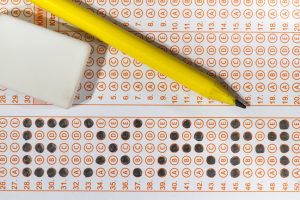
Last
week,
the
California
Supreme
Court
declined
to
adopt
a
proposal
known
as
the
Portfolio
Bar
Examination
(PBE)
that
would
be
a
substitute
for
taking
the
California
Bar
Examination.
Instead,
law
school
graduates
would
engage
in
a
period
of
supervised
practice
and
generate
a
portfolio
of
work
product
while
advising
and
representing
actual
clients.
They
would
also
only
take
a
portion
of
the
California
Bar
Examination
—
specifically
the
performance
test
which
requires
applicants
to
perform
legal
analysis
based
on
specific
information
provided.
The
court
noted
that
the
PBE
is
illegal
because
California
law
requires
admission
to
the
bar
which
requires
an
applicant
to
pass
the
“general
bar
examination.”
The
court
does
not
consider
the
PBE
to
be
equivalent
to
the
general
bar
examination.
The
court
was
concerned
about
the
fairness
of
the
PBE.
It
assumed
that
the
supervising
attorney
would
play
a
role
in
the
creation
of
the
work
product.
But
this
would
make
the
portfolio
dependent
on
the
supervising
attorney.
A
more
skilled
attorney
would
create
a
better
portfolio
than
a
less
skilled
one.
The
court
also
noted
that
there
were
no
safeguards
to
ensure
that
the
applicant
created
their
work
product
as
opposed
to
using
premade
templates
or
other
peoples’
work.
Next,
the
court
stated
that
the
PBE
is
unlikely
to
be
an
adequate
measure
of
an
applicant’s
competence
in
issue-spotting.
In
a
preconstructed
question,
it
would
contain
both
relevant
and
irrelevant
facts
or
law,
and
so
the
grader
would
know
which
issues
a
competent
attorney
should
spot.
On
the
other
hand,
the
issues
involved
in
a
real-world
scenario
are
unknown
to
the
grader.
If
an
applicant
fails
to
identify
a
crucial
fact
or
legal
issue
in
the
portfolio,
the
grader
is
unlikely
to
spot
the
issue
as
well.
The
court
also
found
that
the
PBE
grader
would
be
unable
to
directly
view
an
applicant’s
ability
to
conduct
client
interviews
and
negotiations.
Instead,
the
grader
would
score
these
skills
indirectly
through
redacted
assessments
of
the
applicant’s
performance,
authored
by
the
applicant
and
his
or
her
supervisor.
These
self-reported
assessments
may
not
be
objective.
Also,
the
court
noted
the
ethical
dilemma
of
compelling
inexperienced
attorneys
to
conduct
high-stakes
negotiations
and
interviews.
Lastly,
the
court
noted
that
if
the
graders
were
to
detect
a
subpar
work
product,
the
grader
may
have
the
obligation
to
inform
the
supervisor’s
client
of
the
deficient
work.
The
supervisor
may
even
be
reported
to
the
state
bar
for
failing
to
adequately
supervise
the
applicant’s
work,
which
could
result
in
discipline.
Taking
all
of
the
above
into
account,
the
court
does
not
believe
that
the
PBE
scores
would
be
reliable
due
to
the
disincentives
for
giving
objective
assessments
and
the
lack
of
safeguards
to
ensure
that
the
applicant
completed
his
or
her
own
work
product.
There
are
a
few
observations
from
the
court’s
decision.
First,
the
court
seems
skeptical
about
solely
using
the
supervisor’s
word
to
determine
competency.
It
notes
the
potentially
awkward
position
of
a
supervisor
having
to
give
an
unfavorable
evaluation
of
someone
they
have
trained
and
may
continue
to
work
at
their
firm.
It
should
be
noted
that
other
professions
that
have
experience
requirements
in
order
to
be
certified
or
licensed
(such
as
CPAs
and
medical
residents)
similarly
rely
on
evaluations
from
supervisors
(of
varying
quality)
and
that
hasn’t
resolved
large-scale,
systemic
problems.
But
these
professions
require
applicants
to
take
and
pass
a
general
licensure
examination
to
be
admitted.
Also,
the
court
seems
to
understand
that
some
things
cannot
be
easily
and
reliably
tested,
particularly
when
it
comes
to
soft
skills
such
as
dealing
with
clients
and
people
in
general.
It
would
be
an
arduous
effort
to
evaluate
an
applicant’s
ability
to
engage
with
people
coming
from
various
walks
of
life
with
different
personalities.
Will
the
graders
want
to
know
how
the
applicant
handled
people
from
different
cultures
or
language
barriers?
How
about
people
with
adversarial
interests?
It
will
be
near
impossible
to
cover
every
single
potential
client
encounter.
Also,
how
would
a
candidate’s
honesty
be
tested?
For
example,
if
someone
gets
a
perfect
score
on
the
MPRE,
does
that
mean
he
or
she
is
an
absolutely
ethical
attorney?
Or
would
he
or
she
know
the
rules
well
enough
to
find
and
exploit
loopholes?
The
court
did
not
consider
the
issue
of
specialization.
Considering
that
most
lawyers
today
specialize
in
one
or
a
few
practice
areas,
would
it
be
appropriate
to
issue
a
general
license
to
practice
to
an
applicant
who
studied
under
a
specialist?
Should
someone
who
trained
under
a
family
law
attorney
be
allowed
to
do
worker
compensation
cases?
In
the
final
analysis,
standardized
testing
such
as
the
bar
exam
is
likely
to
stay,
for
better
or
for
worse.
Many
elite
colleges
temporarily
stopped
accepting
standardized
test
scores
but
have
now
reinstated
them.
The
primary
argument
against
the
bar
exam
and
standardized
testing
in
general
is
that
it
benefits
people
who
have
the
means
to
purchase
expensive
bar
exam
prep
courses
or
simply
“test
well.”
While
that
is
a
legitimate
concern,
law
schools
can
address
this
problem
by
offering
their
own
bar
exam
preparation
program.
For
law
schools
with
lower
than
average
first-time
passage
rates,
this
program
should
be
mandatory.
As
for
programs
such
as
the
PBE,
rather
than
being
a
substitute
for
the
bar
exam,
it
should
be
an
optional
replacement
for
the
third
year
of
law
school.
This
could
save
students
one
year
of
tuition
and
even
allow
them
to
earn
enough
money
to
pay
off
the
first
two
years
of
law
school.
Steven
Chung
is
a
tax
attorney
in
Los
Angeles,
California.
He
helps
people
with
basic
tax
planning
and
resolve
tax
disputes.
He
is
also
sympathetic
to
people
with
large
student
loans.
He
can
be
reached
via
email
at
[email protected].
Or
you
can
connect
with
him
on
Twitter
(@stevenchung)
and
connect
with
him
on LinkedIn.

